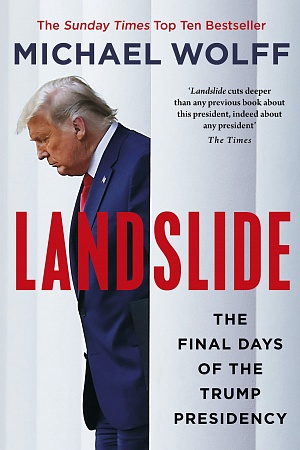Fear: Trump in the White House
Simon & Schuster, $45 hb, 448 pp, 9781471181290
Fear: Trump in the White House by Bob Woodward
Fear: Trump in the White House by Bob Woodward opens with an astonishing incident. In September 2017, Gary Cohn, President Trump’s top economic adviser, removed a letter from the president’s desk. The letter purported to terminate America’s free trade agreement with South Korea – a vital US ally in the Asia–Pacific. Cohn decided he could not afford to take the risk: ‘I stole it off his desk. I wouldn’t let him see it. He’s never going to see that document. Got to protect the country.’
Woodward is a legend in American political reporting. With Carl Bernstein, he exposed Richard Nixon’s involvement in the Watergate break-in and brought down a president in 1974. In the more than four decades since, he has continued to chronicle the American presidency. His great talent is getting well-placed sources close enough to open up to him, albeit on the condition of anonymity. While Trump may have tweeted ‘so many lies and phony sources’ in response to Fear, it speaks to Woodward’s stature and credibility that his reporting on ‘deep background’ is so widely accepted.
Across policy debates, staff firings, international crises, and presidential temper tantrums, Fear paints a damning picture of the president by meticulously reporting the words and actions of those closest to him. From the outset, Trump’s ignorance startles his advisers. On economic matters, Trump ‘clung to an outdated view of America – locomotives, factories with huge smokestacks, workers busy on assembly lines’. In the global arena, his outlook was equally simplistic. ‘The president did not understand the importance of allies overseas, the value of diplomacy or the relationship between the military, the economy and intelligence partnerships with foreign governments.’
Trump’s staff struggle to come to grips with the president’s mendacity on issues large and small. ‘He’s a professional liar,’ Cohn observes more than once. When the president ignored legal advice and agreed to talk to special counsel Robert Mueller (investigating collusion between Russia and the 2016 Trump presidential campaign), his lawyer John Dowd resigned. ‘Mr. President, I cannot, as a lawyer, as an officer of the court, sit next to you and have you answer these questions when I full well know that you’re not really capable.’
Apparently there is no setting, however serious, in which the current president of the United States can be trusted to speak without lying.
In Trump’s moral universe, weakness is perhaps the only unforgivable sin. In August 2017, neo-Nazis, white nationalists, neo-Confederates, members of the so-called ‘alt-right’ and a number of right- wing militias marched through Charlottesville, Virginia to rally against the removal of a statue of Confederate general Robert E. Lee. They clashed violently with protestors. The president’s initial response – condemning hatred, bigotry, and violence ‘on many sides’ – appeared to equate those marching with those protesting the march. Prevailed upon by his staff, Trump issued a second statement that explicitly stated ‘racism is evil’ and which singled out hate groups for criticism. When Fox News suggested this was a ‘course correction’, the president was furious. ‘“That was the biggest [expletive deleted] mistake I’ve made,” the president told [staff secretary Rob] Porter. “You never make those concessions. You never apologize. I didn’t do anything wrong in the first place. Why look weak?”’ A day later, Trump doubled down on his first statement: ‘Not all of those people were neo-Nazis, believe me … you also had people that were very fine people on both sides … there are two sides to every story.’
 President Donald Trump being sworn in on 20 January 2017 at the U.S. Capitol building in Washington (photo via Wikimedia Commons)
President Donald Trump being sworn in on 20 January 2017 at the U.S. Capitol building in Washington (photo via Wikimedia Commons)
In Fear, Woodward also exposes the enormous ideological division within the administration over America’s place in the world. Trump ran for president as an isolationist: anti-immigration, anti-free trade, and against American military deployment unless for tangible gain. In Trump’s reductionist understanding, trade imbalances were equivalent to countries stealing from the United States, collective defence was ‘a sucker play’, and the United States should aggressively pursue its own interests internationally. For example, on discovering that Afghanistan had extensive mineral deposits, the president told his staff, ‘We need to get a company in there … We should just be in there taking it.’ Later, Trump told then national security adviser H.R. McMaster, ‘I don’t need it done through a [expletive deleted] process! … I need you guys to go in there and get this stuff. It’s free!’
Members of the administration manage to block or delay many of the president’s more extreme proposals. Yet Woodward’s reporting suggests that, left to his own devices, Trump would quite happily withdraw the United States from its commitment to a rules-based international order in pursuit of a better deal – a truly terrifying prospect.
 President of Egypt Abdel Fattah el Sisi, King Salman of Saudi Arabia, Melania Trump, and Donald Trump in May 2017 (photo by The White House)
President of Egypt Abdel Fattah el Sisi, King Salman of Saudi Arabia, Melania Trump, and Donald Trump in May 2017 (photo by The White House)
Fear is an engrossing book, but a note of caution is required. Woodward presents the accounts of his sources uncritically, and their agendas – personal and political – pervade the book. There is no analysis of their motives or of the Faustian bargains many have made by working for Trump. Few questions are asked about the legitimacy of staff members actively ‘undermining of the will of the President of the United States and his constitutional authority’.
Further, by relying almost entirely on administration perspectives, the book tends to emphasise the dysfunction in the White House, and obscures some of the administration’s crueller and less defensible actions. Immigration and Customs Enforcement raids and the forced separation of children from their parents, the Muslim travel ban, Trump’s support for accused sexual predator and Alabama Senate candidate Roy Moore, the half-hearted response to Hurricane Maria in Puerto Rico, and the administration’s ongoing voter-suppression efforts, to name a few, are largely ignored.
Fear is also curiously ahistorical. Trump and his movement represent a political strain with a hardy lineage in US politics. But it has always remained at the fringes. In an essay titled ‘The Paranoid Style in American Politics’ (1964), American historian Richard Hofstadter wrote:
[T]he modern right wing … feels dispossessed; America has been largely taken away from them and their kind, though they are determined to try to repossess it … The old American virtues have already been eaten away by cosmopolitans and intellectuals; the old competitive capitalism has been gradually undermined by socialist and Communist schemes; the old national security and independence have been destroyed by treasonous plots, having as their most powerful agents not merely outsiders and foreigners but major statesmen seated at the very centres of American power.
 Bob Woodward (photo by Jay Godwin/Flickr)That this manner of thinking has metastasised across the Republican Party, largely with the quiescence (and periodic encouragement) of its elected leaders, is a major political development in the United States. That the president traffics in conspiracy theories and retweets Russian propaganda is without modern precedent. Yet, despite his experience, Woodward makes no effort to place the events he describes, or Trump’s ascension more generally, in any historical context. The effect is to subtly normalise the administration.
Bob Woodward (photo by Jay Godwin/Flickr)That this manner of thinking has metastasised across the Republican Party, largely with the quiescence (and periodic encouragement) of its elected leaders, is a major political development in the United States. That the president traffics in conspiracy theories and retweets Russian propaganda is without modern precedent. Yet, despite his experience, Woodward makes no effort to place the events he describes, or Trump’s ascension more generally, in any historical context. The effect is to subtly normalise the administration.
Fear’s chief attribute is the reporting. Woodward’s sources have dished on the president they serve, and the assessments are brutal. A professional liar. A [expletive deleted] moron. Unhinged. Off the rails. The understanding of a fifth or sixth grader. Zero psychological ability to recognise empathy or pity.
While Trump’s rages and baser impulses are alarming, the dysfunction Woodward portrays actually comes as something of a relief. It may represent ‘a nervous breakdown of the executive power’ in the United States, but it is hard to imagine that the world would be a better place if the administration was more effective at carrying out Trump’s wishes.











Leave a comment
If you are an ABR subscriber, you will need to sign in to post a comment.
If you have forgotten your sign in details, or if you receive an error message when trying to submit your comment, please email your comment (and the name of the article to which it relates) to ABR Comments. We will review your comment and, subject to approval, we will post it under your name.
Please note that all comments must be approved by ABR and comply with our Terms & Conditions.